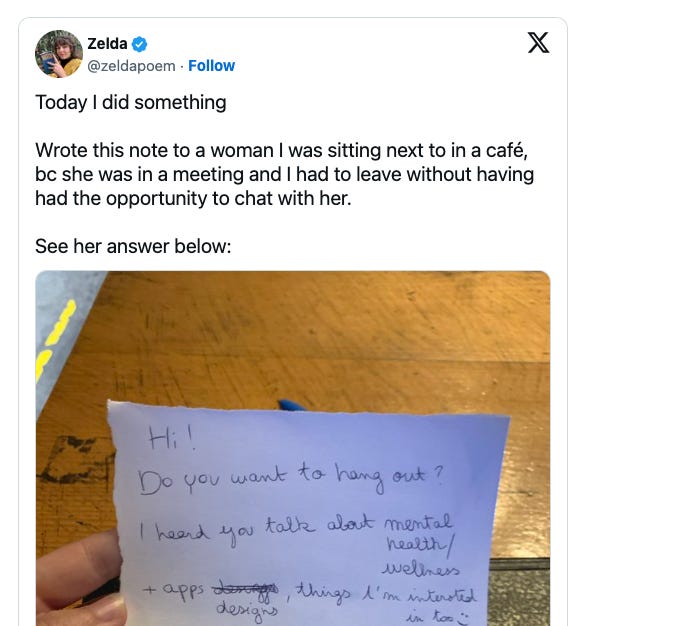How can we cultivate new friendships in adulthood?
This essay was originally published by Vidhika Bansal on her Substack.
A walk in the park
…No, literally. About this time last year, I made a new friend while going for a stroll in my neighborhood park. I knew that was a thing kids did; so many friendship origin stories in childhood seem to be set on the playground. But I didn’t think I’d experience something like that as an adult.
The story’s pretty simple. It starts when — as will be no surprise to anyone who’s ever spent time with me in a park — I was arrested by the cuteness of a dog. Usually I just admire from afar, but this time I approached to ask if I could pet the lil’ furball. The pup’s owner, Trina, was happy to oblige. And Penny the teacup Yorkie and I were happy to be acquainted. Trina and I chatted awhile and learned that we lived within blocks of one another. It was good vibes all around. I remember thinking, “I feel like I could be friends with her!” and wishing I had the guts to say so. I’d just sold my car and moved to the area and was eager for some cool, new, walking-distance-friendly peeps.
Luckily, even though I may not have had the guts, Trina did. As our conversation drew to a close, she handed me her contact info with a confident “you seem cool, let me know if you want to get coffee or wine sometime!” and was on her way. I was caught off guard and grateful — she had seemed cool at first, but cool enough to both read my mind and act on it? Ultra cool. A few weeks later, we enjoyed dinner, wine, and four hours of conversation about everything from jury duty to boys to the best restaurants in town.
My new friends, Penny and Trina
It turns out opportunities to make friends are everywhere, if you’re willing to look.
So what does it take to invite new friends into our lives as adults? A lot and very little, all at once. Here are some of the mental shifts that have helped me.
Go first
Sounds dumbfoundingly simple, right? And yet, approaching new people can be incredibly scary at first. (Believe me, I still struggle with it.)
What if they’re busy? What if they’re not friendly? What if they’re straight up weirded out?
Those are totally reasonable doubts. But they could just as easily be faulty assumptions — or, dare I say, excuses — holding you back from a great connection.
Case in point: Earlier this week, I saw this lovely, heartwarming tweet from my Twitter friend Zelda. She befriended someone at a cafe — without even talking to her! Talk about friend-finding wizardry.
What if my now-friend Trina hadn’t expressed that she wanted to hang out? What if Zelda hadn’t taken the initiative to leave that earnest note for her fellow café-goer?
As Kevin Kelly, the founding executive editor of Wired Magazine, reminded us in tip #17 of his wonderful 68 Bits of Unsolicited Advice:
“Everyone is shy. Other people are waiting for you to introduce yourself to them, they are waiting for you to send them an email, they are waiting for you to ask them on a date. Go ahead.”
So many friendships wouldn’t even have begun, let alone blossomed, if someone hadn’t gone first. Instead, they would have remained a series of what-ifs, missed opportunities, vessels of unexplored potential.
Maybe even regrets.
So take heart: have a little courage, make the first move. It’s much better to have an “at least I tried” under your belt than an “if only I tried.” The latter stings far more. And there are so many people in this world (reminder: you are a person; you count!) who will be grateful to you for having taken the first step.
Dare to let the haters hate and the judgers judge
The technology at our fingertips is a powerful vehicle for connection if we let it be.
I mean, look at dating. Once upon a time, finding someone to spend your life with on the internet was a laughable matter. Desperate, even. But now? Couples who met online are as common as butter on toast.
It didn’t become this common overnight though. There were folks who bucked the norms (I see you, early-2000s OKCupid users!) and blazed the trail for finding love online. It may have been seen as strange or cringe-y at the time, but those who made it work for them didn’t care. Or even if they did care, they did it anyway. They didn’t let the haters and the judgers stop them.
So why should we?
Why should the notion of finding friends online be so different, so stigmatized?
Could this just be another episode of “because this is how we’ve always done it”?
I’ll admit that at first I was a skeptic myself. Growing up, I had a few friends who would talk about the internet friends they made via IRCs and video games, and I thought it was cool but just couldn’t relate. I was a proud AIM user (the broody-song-lyrics-as-away-message type), but all my AIM friends were high school friends from “real life” vs. total strangers.
But since my AIM days, I’ve laughed with, cried with, dined with, traveled with, and even lived with people I’ve met on the internet.
Good connections can happen on any medium if the conditions and intentions are right. Whether it’s Twitter or Reddit or Bumble BFF, there are likely people out there you’ll vibe brilliantly with. Just because a connection doesn’t start in the same physical location doesn’t make it any less worthy or deep or real. Don’t let your worries about what others might think or say stop you from finding more of your future friends, collaborators, and soul siblings. Allow yourself to blaze the trail.
Remember that what’s for you won’t go by you
What if you go first, step out of your comfort zone, and it still doesn’t work out?
Let’s just say, I’ve been there, done that. Many a time. Does it suck a little? Yeah. Does it almost always lead to better things down the road? Also yeah.
There’s a Scottish proverb, “what’s for you won’t go by you” (pronounced a lot more like whits fur ye’ll no go by ye) and aside from it being a nice, pithy phrase, I like to think there’s a lot of truth there. The basic idea is that if something doesn’t work out the way we want, we shouldn’t force it; it’s simply not meant for us. We can extend it to say “who’s for you won’t go by you” and it’d still be true.
We can’t be for everyone and everyone can’t be for us. Not every attempt at connection is going to bear fruit. But that doesn’t mean we shouldn’t try. If we were meant to be friends with literally everyone, friendship wouldn’t be nearly as special. And can you imagine the godforsaken state of our calendars and social batteries?!
Figuring out who’s not for us helps us get clearer and closer to who is. Either you win or you learn — and learning is just winning differently.
A return to childlike wonder
I’ll leave you with one of my 13927 favorite quotes. I first read it on the side of a coffee cup via Starbucks’ The Way I See It campaign, circa 2005 — big shoutout if you have any idea what I’m talking about:
“I used to feel so alone in the city. All those gazillions of people and then me, on the outside. Because how do you meet a new person? I was very stunned by this for many years. And then I realized, you just say, “Hi.” They may ignore you. Or you may marry them. And that possibility is worth that one word.” (Augusten Burroughs)It may seem like the simpler times of nonchalantly going “hi, wanna be friends?” on the playground are over, but I’d argue they’re not. Not really, anyway. We just aren’t used to asking that question anymore; we’re too muted, too scared. Adulthood brings with it a lot of great things — more rights, capital, even wisdom if we’re lucky — but also more fear. Even so, approaching friendship with that childlike wonder and genuine interest in other people is still just a hop, skip, or DM away.So, friends, I hope you go first. I hope you take that walk, pass that note. I hope you won’t let fear or hesitation hold you back. I hope you trust that good things often come from outside the “how we’ve always done it” cage and that what’s for you won’t go by you.
And I hope that if you want to be friends, you won’t hesitate to leave a comment or reach out! I’d love to hear from you (good opportunity to practice going first, hehe).
<3,
Vidhika



